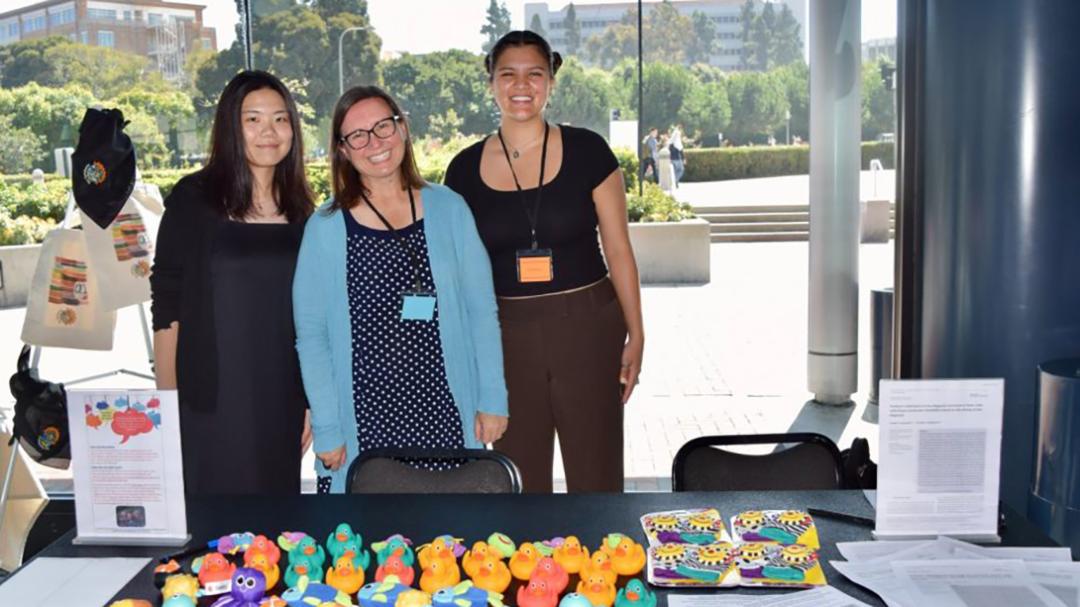
Angela Lukowski is flanked by members of her UCI INCHES (Understanding Contextual Influences on Infants and Children) Lab at the 2024 Down Syndrome Showcase. Photo courtesy of the Center for Aging Research in Down Syndrome.
Center for Aging Research in Down Syndrome spotlights Lukowski’s work
Psychological science Associate Professor Angela Lukowski started attending the UC Irvine Center for Aging Research in Down Syndrome colloquia a few years ago, was formally asked to become a CFAR-DS faculty affiliate in March 2023 and is now conducting three Down syndrome-focused studies.
“Connecting with the community and conducting work that matters to individuals with DS and their families is one of the most meaningful aspects of my career,” says Lukowski in the following Q&A posted recently on the CFAR-DS website.
Some of Lukowski’s recent research focuses on associations between memory and well-being in parents of children who have Down syndrome.
Tell us about your journey to UC Irvine.
“I went to a small liberal arts college for undergrad and majored in psychology (after a brief initial stint as a music major – I wanted to be a singer!). I conducted research in two different labs as an undergrad, but I wanted to learn more about academic life at a major research institution. For that reason, I applied to Research Experiences for Undergraduates programs the summer after my junior year of college. I was ultimately selected to attend the program offered through the Center for Cognitive Sciences at the University of Minnesota. I had a great experience that summer and continued working on my assigned project with my summer research mentor throughout my senior year of college. I applied to Ph.D. programs that same year, and the Institute of Child Development at the University of Minnesota was my top choice. I started graduate school there in 2001, I finished my Ph.D. in 2007, and I completed a post-doctoral fellowship at the Center for Human Growth and Development at the University of Michigan immediately after. I started my career at UCI as an assistant professor in the Department of Psychology and Social Behavior (now Psychological Science) in 2008.”
What Down syndrome-focused studies are you currently leading?
“My lab is currently conducting three DS-focused studies. We have been collecting data on a study examining recall memory and generalization of learning in young children with DS for some time now (we are still recruiting families with children with DS who are younger than 5 years old!). Our second ongoing study examines parents’ reflections on significant life events with their child with DS, including when their child was born and when they learned of their child’s DS diagnosis. We previously conducted similar research with moms as participants; this ongoing study includes both moms and dads. Our third study focuses on dinnertime conversations in families who have 9- to 12-year-old children with DS. Researchers have previously examined associations among family conversations and child functioning, but our study is the first to our knowledge to examine these relationships in families with children with DS.”
What is your favorite part of being a researcher?
“My favorite part of being a researcher is conducting work that has the potential to meaningfully impact the lives of children with DS and their families. I love sharing the results of our collective efforts with and having the opportunity to learn more from them about where additional research is needed based on their lived experiences. Connecting with the community and conducting work that matters to individuals with DS and their families is one of the most meaningful aspects of my career.”
Where do you do your research?
“We do our behavioral studies with young children in child-safe lab space on campus, our parent interviews are done online through Qualtrics and Zoom, and our dinnertime conversation study will be done naturalistically in families’ homes (we will send out audio recorders that families will mail back to us when data collection is complete). Conducting much of our research online and in families’ homes allows us to recruit participants from across the country, ultimately yielding a larger and more diverse sample than is possible when we have to test participants in the lab here in Southern California.”
When did you join CFAR-DS and what prompted you to?
“I started attending the CFAR-DS colloquia to become more involved with a community of scholars who were at the forefront of scientific discoveries on DS and Alzheimer’s disease. I was formally invited to become a faculty affiliate of CFAR-DS in March 2023 after presenting my research at one of the monthly meetings. My involvement in this academic community has broadened my perspective on my own work and has deepened my knowledge of the important research that is being conducted here at UCI and at other institutions. I feel incredibly fortunate to count myself among this incredible group of faculty, post-docs, graduate students, and staff who are working to make the world a better place for individuals with DS and their families.”